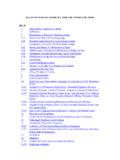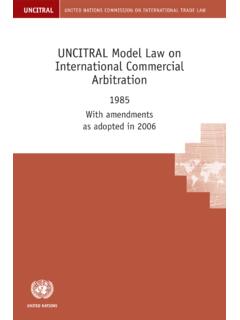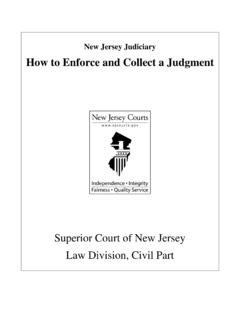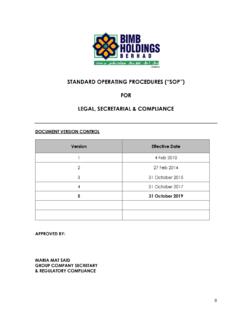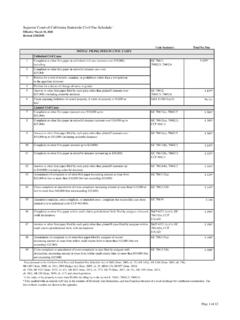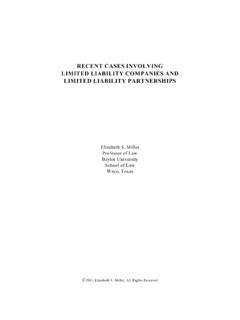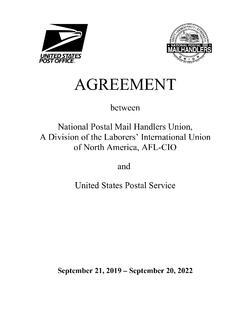Transcription of CORRELATION TABLE FORMS REFERENCE TABLE ARIZONA …
1 1 CORRELATION TABLE FORMS REFERENCE TABLE ARIZONA RULES OF FAMILY LAW PROCEDURE I. GENERAL ADMINISTRATION Rule 1. Scope of Rules 2. Applicability of Other Rules 3. Definitions 4. Time 5. Consolidation 6. Change of Judge 7. Protected and Unpublished Addresses 8. Telephonic Appearances and Testimony 9. Duties of Counsel 10. Representation of Children; Minors and Incompetent Persons 11. Presence of Children 12. Court Interviews of Children 13. Public Access to Proceedings 14. Sworn Written Verification; Unsworn Declarations under Penalty of Perjury 15. Affirmation in Lieu of Oath 16. Interpreters 17. Limitation on Examination of Witness; Exception 18. Preservation of Verbatim Recording of Court Proceedings 19. Lost Records; Method of Supplying, Substitution of Copies; Hearing if Corrections Denied 20.
2 Electronic Filing 21. Local Rules by Superior Court 22. [Reserved] II. PLEADINGS AND MOTIONS Rule 23. Commencement of Action 24. Pleadings Allowed 25. Family Law Cover Sheet 26. Additional Filings 27. Service on the Opposing Party or Additional Parties 28. Mandatory Responsive Filings 29. General Rules of Pleading 30. Form of Pleading 31. Signing of Pleadings 32. Defenses and Objections; When and How Presented; By Pleading or Motion; Motion for Judgment on Pleadings 33. Counterclaims; Third Party Practice 2 34. Amended and Supplemental Pleadings 35. Family Law Motion Practice III. PARTIES Rule 36. Real Party in Interest 37. Substitution of Parties 38. Process on Behalf of and Against Persons Not Parties 39. Proof of Authority by Attorney for Defendant Not Personally Served IV.
3 SERVICE OF PROCESS Rule 40. Process 41. Service of Process within ARIZONA 42. Service of Process Outside of State 43. Service and Filing of Pleadings and Other Papers; Sensitive Data Form V. DEFAULT DECREE, CONSENT DECREE, AND DISMISSAL Rule 44. Default Decree 45. Consent Decree, Order or Judgment Without Hearing 46. Dismissal VI. TEMPORARY ORDERS Rule 47. Temporary Orders 48. Temporary Orders Without Notice VII. DISCLOSURE AND DISCOVERY Rule 49. Disclosure 50. Complex Case Disclosure 51. Discovery 52. Subpoena 53. Protective Orders Regarding Discovery Requests 54. Depositions before Action or Pending Appeal 55. Persons before Whom Depositions May Be Taken 56. Stipulations Regarding Discovery Procedure 57. Depositions upon Oral Examination 58. Depositions upon Written Questions 59.
4 Use of Depositions in Court Proceedings 60. Interrogatories to Parties 61. Uniform and Non-Uniform Interrogatories; Limitations; Procedure 62. Production of Documents and Things and Entry upon Land for Inspection and Other Purposes 63. Physical, Mental, and Vocational Evaluations of Persons 64. Requests for Admission 3 65. Failure to Make Disclosure or Discovery; Sanctions VIII. SETTLEMENT AND ALTERNATIVE DISPUTE RESOLUTION (ADR) Rule 66. Alternative Dispute Resolution; Purpose, Definitions, Initiation, and Duty 67. Mediation, Arbitration, Settlement Conferences, and Other Dispute Resolution Processes Outside of Conciliation Court Services 68. Conciliation Court Services; Counseling, Mandatory Mediation, Assessment or Evaluation and Other Services 69. Binding Agreements 70. Settlement 71.
5 Sanctions and Attorneys Fees 72. Family Law Master 73. Family Law Conference Officer 74. Parenting Coordinator 75. Plan for Expedited Process IX. PRETRIAL AND TRIAL PROCEDURES Rule 76. Pretrial Procedures 77. Trial Procedures X. JUDGMENTS AND DECREES Rule 78. Judgments; Costs; Attorneys Fees 79. Summary Judgment 80. Declaratory Judgments 81. Entry of Judgment 82. Findings by the Court; Judgment on Partial Findings 83. Motion for New Trial 84. Motion to Alter or Amend a Judgment or Decree 85. Motion to Correct Mistakes; Relief from a Judgment or Decree 86. Harmless Error 87. Stay of Proceedings 88. Disability of a Judge 89. Judgment for Specific Acts; Vesting Title 90. Process on Behalf of and Against Persons Not Parties XI. POST-DECREE/POST-JUDGMENT PROCEEDINGS Rule 91.
6 Post-Decree and Post-Judgment Proceedings XII. CIVIL CONTEMPT AND ARREST WARRANTS Rule 92. Civil Contempt and Sanctions for Non-Compliance with a Court Order 93. Seizure of Person or Property 94. Civil and Child Support Arrest Warrants 4 XIII. OTHER FAMILY LAW SERVICES AND RESOURCES Rule 95. Other Family Law Services and Resources 96. [Reserved] XIV. FAMILY LAW FORMS Rule 97. Family Law FORMS 5 I. GENERAL ADMINISTRATION Rule 1. Scope of Rules These rules govern the procedure in the Superior Court of ARIZONA in all family law cases, including paternity, and all other matters, arising out of Title 25, ARIZONA revised Statutes ( ) and, where ordered by the presiding judge of a county or the presiding judge s designee, Orders of Protection, Injunctions Against Harassment and all proceedings, judgments or decrees related to the establishment, modification or enforcement of such orders, including contempt.
7 These rules should be construed and enforced in a manner to secure the just, prompt and inexpensive determination of every action and proceeding. COMMITTEE COMMENT This rule is based on Rule 1, ARIZONA Rules of Civil Procedure. Wherever the language in these rules is substantially the same as the language in other statewide rules, the case law interpreting that language will apply to these rules. Rule 2. Applicability of Other Rules A. Applicability of ARIZONA Rules of Civil Procedure. The ARIZONA Rules of Civil Procedure apply only when incorporated by REFERENCE in these rules. B. Applicability of ARIZONA Rules of Evidence 1. Upon notice to the court filed by any party at least forty-five (45) days prior to hearing or trial, or such other date as may be established by the court, any party may require strict compliance with all or part of the ARIZONA Rules of Evidence.
8 If a hearing or trial is set upon less than sixty (60) days prior notice, the notice provided for in this paragraph will be deemed timely if filed within a reasonable time after the party receives notice of the hearing or trial date. 2. If no such notice is filed, all relevant evidence is admissible, provided, however, that the court shall exclude evidence if its probative value is outweighed by the danger of unfair prejudice, confusion of the issues, or by considerations of undue delay, waste of time, needless presentation of cumulative evidence, lack of reliability or failure to adequately and timely disclose same. 3. The foregoing notwithstanding, records of regularly conducted activity as defined in Rule 803(6), ARIZONA Rules of Evidence, may be admitted into evidence without testimony of a custodian or other qualified witness as to its authenticity if such document (a) appears complete and accurate on its face, (b) appears to be relevant and reliable, and (c) is seasonably disclosed and copies are provided at time of disclosure to all other parties.
9 4. Any report, document, or standardized form required to be submitted to the court for the current hearing or trial may be considered as evidence if either filed with the court or admitted into evidence by the court. 6 C. Applicability of Local Rules. To the extent these rules are inconsistent with local rules, the provisions of these rules shall apply. COMMITTEE COMMENT Rule 2(B)(4) allows the court to consider as evidence at any stage of the proceedings any report or document ordered or required by the court to be submitted to the court. This allows the court to consider drug testing results and reports from court-appointed attorneys, guardians ad litem, custody or parenting time evaluators, conciliation services, family law masters, Parenting Coordinators, and other court-appointed experts.
10 The evidentiary value is limited to the particular trial, hearing or conference for which it is prepared and filed. Rule 3. Definitions A. Parties. REFERENCE to a party to the action may include the state. B. Definitions. In these rules, unless the context otherwise requires, the following definitions shall apply: 1. In camera. If the court orders that a document be reviewed in camera, the party who possesses the document shall submit the document ex parte to the court. The court shall then privately review the document to determine whether it should be further disclosed under applicable law and rules. 2. Motion. A motion is a written request made after a petition seeking relief is filed. 3. Moving Party. The party (movant or applicant) who has filed a written request for relief, regardless of whether or not that party was the petitioner or respondent in the initial petition.
